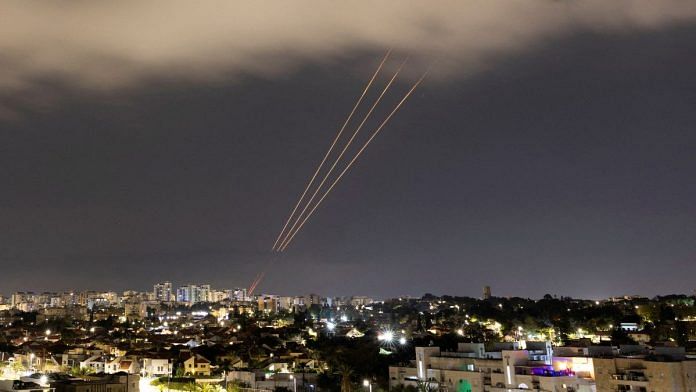On 1 April, Israeli warplanes launched an airstrike on the Iranian consulate building in Damascus, Syria, blatantly violating the Vienna Convention on Diplomatic Relations 1961. The brazen attack killed seven Iranian military advisors, including two senior commanders. This act of aggression is just one in a series of provocations by the Israeli regime against Iran. In January, an Israeli missile strike in Damascus had killed another high-ranking commander who was serving as a military advisor.
In addition to attacks on military officials, the Iranians will never forget the assassinations of their nuclear scientists allegedly by Israel with the support of American intelligence. Perhaps Iran’s excessive patience and self-restraint have caused Israel’s miscalculation in repeatedly testing Tehran’s will.
Since the start of Israel’s war in Gaza, in which over 33,000 Palestinians, more than 14,000 of them children, have been killed. The Zionist regime is eager to expand the scope of the conflict—and drag the US to cover up its failure in eliminating Hamas.
Also read: Story of Israel-Iran friendship shows the latest conflict is neither inevitable nor permanent
Iran’s self-defence
During the Eid al-Fitr prayer ceremony, Iran’s Supreme Leader, Ali Khamenei, vowed to retaliate Israel’s attack on the Iranian consulate building. Iran fulfilled this pledge on 14 April with an operation named Truthful Promise. Invoking Article 51 of the UN Charter, Iran acted in self-defence and, for the first time, targeted Israeli military sites from within its borders, firing more than 300 missiles and drones.
From a legal standpoint, any violation of the immunity of premises and diplomats, or worse a military attack, constitutes a severe breach of a country’s rights. A military strike exposes the malicious intent, drawing international condemnation and potential compensatory actions. However, what action did the United Nations and its Security Council take against Israel’s blatant violation and a clear breach of international conventions with the 1 April attack? Nothing.
In a situation where the international community turns a blind eye to one country’s use of armed forces, the victim nation is compelled, as an independent sovereign, to act in defence of its rights based on its interests and national security. Iran could have retaliated by attacking an Israeli embassy, potentially killing civilians. However, unlike the killer regime, Tehran responsibly limited its revenge to military sites in Israel.
Iran’s prolonged mission planning shows its priority of rational decision-making, even at the cost of losing more than 10 days. The calculated response to continuous provocations, striking military targets while avoiding civilian casualties, underscores Tehran’s commitment to upholding international norms. While more time is needed for experts to reveal the military achievements of this action, Iran’s retaliation is a historic turning point. With a response that cost Israel and its allies more than a billion dollars, Iran has changed the status quo after 14 April at a much lower cost.
Israeli Prime Minister Benjamin Netanyahu will likely take even more erratic actions, especially now that he is more isolated than before and finds himself on the losing side. Basically, madness cannot be predicted or analysed. While the notion of attacking Iran’s nuclear facilities has only been realised in Hollywood after years of military drills, it is not unlikely that a madman would want his dream to be the final sequence of his last days. However, there is hope that the cost-benefit logic will prevail in the US and halt the cycle of retaliation.
Also read: Israel war on Gaza has gone beyond ‘right to self-defence’ to ‘responsibility to protect’
Iran’s strategic thinking
The war of narratives has just begun. The Western media has not only downplayed Iran’s military success as insignificant and trivial, it has portrayed the country as a bigger threat. Meanwhile, Tehran’s actions so far have shown that it considered comprehensive strategic thinking even for non-military dimensions of the crisis. The timely release of two well-written statements from military authorities, alongside diplomatic and media activities, highlights the maturity of a nation defending itself after four decades of revolution. Iran responsibly declared that its 14 April attack was a limited response and punishment, with no intention of escalating hostilities.
Despite Iran’s evident military capabilities and shared reluctance between Tehran and Washington to escalate the conflict, the reckless gambler Netanyahu has tested both Iran and US by attacking the consulate in Syria. It became clear that Tehran was not bluffing when it played a better hand to preserve the pride of its several thousand-year-old civilisation.
In the eight-year war with Iraq—from 1980 to 1988—Iran realised it had no choice but to pay a heavy price to create security and maintain its pride independently. In the following years, it acquired missile and drone capabilities despite facing difficulties. While shouldering the cost of security has led to numerous economic challenges for Iran, it sat with pride on the night of the operation, watching its defence achievements pierce through Israel’s flimsy dome, and remained awake until morning. Now all eyes are on Netanyahu to see if he will obey his older brother’s signal to quit the game or empty his pocket to the last coin and walk away.
Majid Afshani is the Director of the International Department at the Governance and Policy Think Tank (GPTT). Views are personal.
(Edited by Ratan Priya)




seems you are analyzing this issue from one side only and also you are living in the dream world. right some good and unbiased piece.